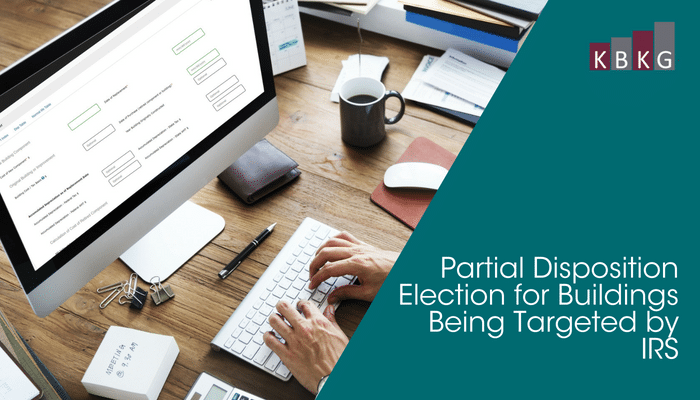
What are the Final Repair Regulations?
The IRS issued comprehensive Repair Regulations regarding the deduction and capitalization of expenditures related to tangible property. The regulations are commonly known as the Repair Regulations or the Tangible Property Regulations. The regs are applicable to businesses in all industries that acquire, produce, replace or improve tangible property. Application of the new Repair Regulations requires an in-depth understanding of various tax cases and circumstances that must be met.
KBKG is ready to identify and claim your missed deductions and help you conform to the new Repair Regulations.
Our experts have been educating tax professionals with seminars and webinar, and helping businesses retroactively claim any missed deductions.
Who Can Benefit From a Repair Regulations Study?
The Repair Regulations mostly affect real property and can provide significant benefits even if a cost segregation study has already been performed. IRS procedures allow you to apply these rules retroactively and claim any missed deductions using Form 3115. Correcting these errors is considered an Automatic Change of Accounting Method and does not require amending any returns.
Generally, anyone that has incurred significant costs for renovations to their existing property in the last 15 years is an ideal candidate. The original improvements should be placed in service for at least one year before renovations occur.
KBKG recommends a formal study if at least $500,000 or more is spent on renovations.
Partial Disposition Calculator
The KBKG Partial Disposition Calculator is designed to make calculations as simple as possible while minimizing unnecessary work. By providing basic data, the calculator provides a PPI adjusted value while considering the condition of the respective component at the time it was acquired (accomplished by considering the component’s normal life, quality, and age).
Significant Rule Changes to Repair Regulations
Below are a few significant rules changes of note regarding Repair Regulations
Whether Building Expenditures are Capital Improvements or Repair Expenses
The IRS outlines numerous subjective factors that must be considered when deciding if the building expenditure is an improvement or a repair expense. KBKG engineers will help you determine when it's appropriate to expense things such as windows, roofs, HVAC, plumbing and electrical based on your unique situation.
Write-off Structural Components of Buildings When Retired or Demolished.
Structural components of a building include items with a long tax life (generally 39, 27.5 or 15 years) such as lighting, roofs, HVAC systems, interior and exterior walls, etc. The new regulations allow you to assign a value to those items and write them off when replaced.
Plan of Rehabilitation Doctrine is Now Obsolete
Under the old rules, you had to capitalize any routine repair work that was performed at the same time as other major improvements. If you did not expense repair work done in the past under the old regulations, you are now able to claim those missed deductions without amending tax returns.
Repair vs. Capitalization Review Insights

This Month’s Webinars
11/01/2022Looking for CPE credit? We have several sessions available this month. Click the links below to register. If you have questions or need help registering, please email [email protected]. Research & Development Tax Credits 11/1/2022 | 12:00 PM PT | 1 hour | 1 CPE credit This webinar will cover the fundamentals of the Research and … Read More

Evaluating a Cost Segregation Provider? Consider Someone with the ASCSP Certification
07/23/2019Are you considering a cost segregation study? As you begin to evaluate potential service providers, it’s important to remember that there are significant differences among cost segregation advisors in the marketplace. Sometimes taxpayers are not immediately aware of how those differences may impact their experience from start to finish. The American Society of Cost Segregation … Read More

Partial Disposition Election for Buildings Being Targeted by IRS
06/18/2018Recently, the IRS Large Business and International division highlighted five issues that it will be targeting in its “compliance campaign” audit strategy this year. One of the issues on its radar is the partial disposition election for buildings and its structural components. Treasury Regulations provide guidelines for recognizing gain or loss on the disposition of … Read More
KBKG Tax Insight: Guide to Expensing Roofing Costs
06/21/2017Each year, tax professionals who deal with real estate must evaluate the most recent building expenditures and determine which items should be written off as a repair expense or capitalized. The most common, and often significant, item that is evaluated is roofing-related work. In many cases, only a portion of the roofing system is replaced, … Read More
KBKG Tax Insight: IRS Provides Extension to Claim Missed Repair Deductions on 2016 Returns
12/27/2016The recently released IRS Notice 2017-6 extended a special eligibility rule for taxpayers making an automatic change of accounting method providing an opportunity to continue to take advantage of the Tangible Property Regulations (TPRs) on 2016 tax returns. KBKG Insight: Current rules under Rev. Proc. 2015-13 prevent taxpayers from making an automatic change in accounting … Read More
IRS provides 1 year extension to claim missed repair deductions on 2015 returns
06/03/2016The recently released Rev. Proc. 2016-29 details new procedures for automatic accounting method changes, as discussed in a previous KBKG Tax Insight, and effectively provides a one year extension for taxpayers to implement many portions of the Tangible Property Regulations (TPR).Taxpayers are generally not permitted to make an automatic method change if they made a … Read More
Retail/Restaurant Industry Safe Harbor Under Tangible Property Regulations
01/13/2016The IRS recently issued Revenue Procedure 2015-56 providing a safe harbor for certain taxpayers operating retail or restaurant establishments for determining whether expenditures incurred to “remodel” or “refresh” their property can be expensed under the Tangible Property Regulations released in 2013. Generally, the safe harbor benefits those enhancing the physical appearance and layout of their … Read More
Repair Regs – Another solution to “Elect-out” of Rev. Proc. 2015-20 to preserve missed deductions
08/21/2015The IRS has recently written on their website that eligible taxpayers may elect out of Rev. Proc. 2015-20 by filing a statement with their 2014 tax returns indicating their qualifying trade or business is not applying the simplified procedure of Rev. Proc. 2015-20. Qualified small business taxpayers who accept the relief of Rev. Proc. 2015-20 … Read More
Tangible Property Regs – Reconsidering Small Taxpayer Relief under RP 2015-20
08/18/2015Earlier this year, the IRS relieved small business taxpayers from having to file mandatory Form 3115’s to comply with the newly issued Tangible Property Regulations (TPRs). Accepting this relief under Rev. Proc. 2015-20 is done merely by filing of a federal tax return, leaving many CPAs unaware of the negative consequences of doing nothing. More … Read More
IRS Releases New Draft Form 3115
07/20/2015On July 15th, The IRS posted onto its website an early released draft of Form 3115, Application for Change in Accounting Method. Form 3115 is used for accounting method changes, including complying with the Tangible Property Regulations (“TPRs”) as well as making depreciation adjustments resulting from Cost Segregation studies. The current version of Form 3115 … Read More


